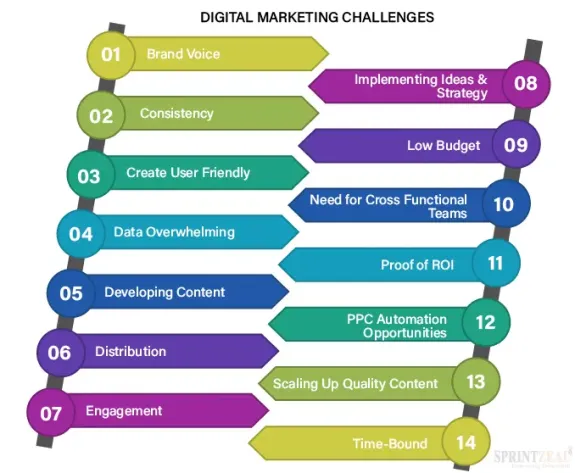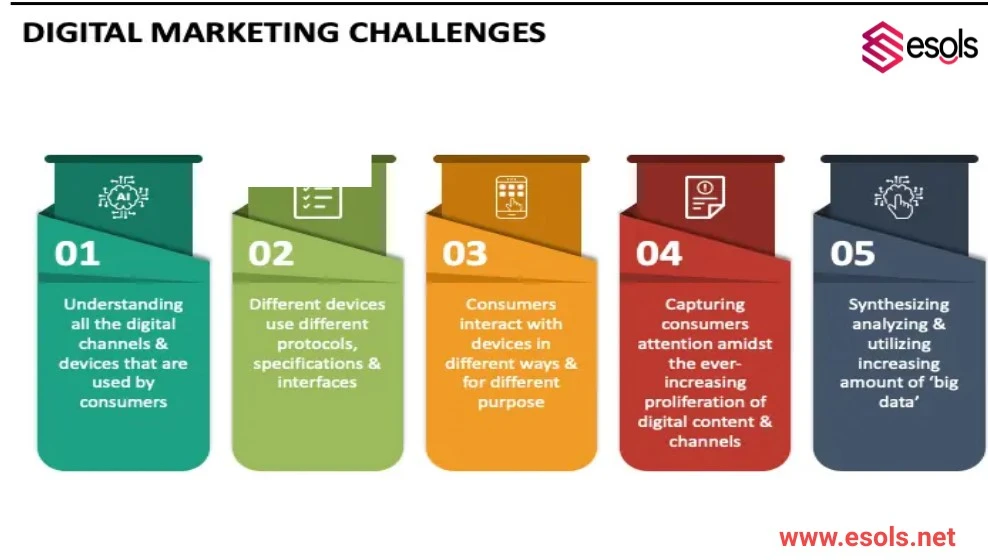Digital marketing, in its ever-evolving landscape, presents numerous hurdles that marketers face in their quest to reach and engage audiences effectively. The advent of technology has revolutionized the way businesses connect with consumers, but it has also brought forth a spectrum of challenges that demand innovative solutions.
Table of contents
- Digital Marketing Challenges
- Rapid Technological Changes in Digital Marketing
- Continuous Learning :
- Agility in Strategy :
- Consumer Behavior Shifts in Digital Marketing Challenges:
- Data Privacy and Regulations For Marketing
- Content Overload and Engagement
- Budget Constraints and ROI Pressure in Marketing
- Talent Acquisition and Skill Gaps
- Global Market and Cultural Differences
- Conclusion
- FAQ’s
Digital Marketing Challenges
In today’s digital age, the significance of effective marketing strategies cannot be overstated. From social media campaigns to targeted advertisements, businesses harness various digital platforms to promote their products or services. However, this landscape is riddled with complexities that pose substantial challenges.

Rapid Technological Changes in Digital Marketing
The rapid pace of technological advancements often leaves marketers grappling with adaptation. New tools and platforms emerge frequently, altering consumer behavior and expectations. Navigating this ever-changing terrain requires agility and a keen eye for innovation.
Continuous Learning:
- Keeping up with new technologies requires a commitment to continuous learning.
- Marketers need to stay updated on emerging tools, platforms, and trends.
Agility in Strategy:
- Rapid technological changes demand flexible strategies.
- Being able to pivot quickly in response to new developments is crucial.
Consumer Behavior Shifts in Digital Marketing Challenges:
- Technologies often shape how consumers interact with brands.
- Understanding these shifts is vital for crafting effective marketing strategies.

Data Privacy and Regulations For Marketing
Amid the digital marketing Challenges , concerns regarding data privacy and regulations loom large. Legislations like GDPR and CCPA aim to protect user data, compelling marketers to strike a delicate balance between personalization and respecting privacy boundaries.
Content Overload and Engagement
The digital sphere is inundated with content, making it arduous for brands to capture and retain audience attention. Crafting engaging content that stands out amidst the noise is a persistent challenge. The abundance of data in digital marketing necessitates sophisticated analytics for meaningful insights. Deciphering and utilizing this data efficiently pose considerable challenges for marketers, impacting decision-making processes.
Budget Constraints and ROI Pressure in Marketing
Optimizing budget allocation and demonstrating ROI across diverse digital channels are persistent Digital Marketing challenges faced by marketers, requiring judicious financial planning.
Talent Acquisition and Skill Gaps
The evolving nature of digital marketing necessitates skilled professionals. Bridging skill gaps and acquiring talent equipped for the dynamic field poses a significant challenge. Understanding and adapting to shifting consumer behaviors is vital. Crafting personalized, customer-centric strategies that resonate with changing preferences is a constant challenge.
Global Market and Cultural Differences
Marketers encounter challenges while tailoring strategies for diverse global markets. Cultural sensitivity and localization are pivotal in effective digital marketing campaigns.
| Challenges in Global Markets | Importance of Cultural Sensitivity and Localization in Digital Marketing |
| 1. Language Barriers | – Localization ensures content is accurately translated into local languages. – Cultural sensitivity helps avoid language-related misunderstandings or offensive messages. |
| 2. Cultural Differences | – Understanding cultural nuances prevents inappropriate or insensitive content. – Tailoring marketing messages based on cultural values and beliefs enhances audience engagement. |
| 3. Consumer Behavior | – Cultural sensitivity helps in comprehending different buying behaviors and preferences. – Localizing campaigns based on consumer behavior increases the chances of successful conversions. |
| 4. Legal and Regulatory | – Adhering to local laws and regulations avoids legal complications or penalties. – Cultural sensitivity ensures marketing campaigns comply with societal norms and values. |
| 5. Brand Perception | – Cultural sensitivity preserves brand reputation by avoiding offensive content. – Localization fosters positive brand perception by resonating with local audiences. |
| 6. Communication Channels | – Understanding preferred communication channels in different cultures helps in selecting the right platforms. – Cultural sensitivity ensures the use of appropriate tone and messaging across channels. |
Conclusion
In conclusion, the landscape of digital marketing is replete with challenges that demand constant adaptation and innovation. Successfully navigating these hurdles requires marketers to embrace change, foster innovation, and craft strategies that resonate with an ever-evolving digital audience.
Readmore : How Often Do You Use Social Media?
FAQ’s
Marketers can adapt by fostering a culture of continuous learning and agility, staying updated on emerging technologies, and embracing innovation in their strategies
Crafting highly relevant and personalized content, focusing on storytelling, and leveraging interactive formats like videos and user-generated content aids in cutting through the content clutter.
Marketers optimize budgets by leveraging data analytics for precise targeting, focusing on high-impact channels, and continually refining strategies to maximize returns.
Investing in training programs, collaborating with industry experts, and fostering a dynamic work culture that encourages learning and innovation helps attract and retain skilled digital marketing professionals.




